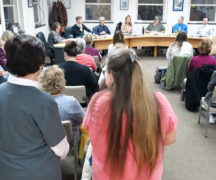By JAN LARSON McLAUGHLIN
BG Independent News
With one member warning that taking steps toward rental housing inspections now is like opening Pandora’s box, Bowling Green City Council voted Saturday to create a rental registry and eventually add an inspection program.
After a seven-month hiatus on the rental housing issue due to COVID-19, council’s Committee of the Whole met Saturday morning to pick up where it left off in the spring. At least five public hearings had been held on rental housing conditions in the city, in which tenants told of landlords not providing safe living conditions, and landlords defended their properties and resisted any type of inspections.
The Community Improvement Committee – which includes council members Bill Herald, Neocles Leontis and John Zanfardino – gathered public input and made several recommendations of how council could proceed.
On Saturday, Zanfardino refreshed council’s memory of the recommendations made in April.
“I have been on council a long time, and I long felt we need to more aggressively address our rental and housing conditions,” he said.
“My belief is that we have a system with little to no proactive oversight of rentals,” Zanfardino said. “This has resulted in the decline of the housing base in Bowling Green.”
Many communities in Ohio – especially college towns with large rental populations – already have registration, licensing and inspection programs in place, he said.
“We have none of those in place,” Zanfardino said. “We have basically an unregulated rental situation.”
The current system is based almost exclusively on complaints by tenants. But many of the renters in town are BGSU students and impoverished residents – and it’s likely many don’t report problems out of fear of retaliation, he said.
Zanfardino talked about the three major stakeholders in rental housing – the tenants, adjacent homeowners, and landlords.
“I have long felt that our system is skewed toward the interest of the landlords to a great extent,” he said.
The issue affects the entire community, with two studies for the city pointing out concerns about Bowling Green’s housing stock, he added.
Zanfardino reminded council of the recommendations made by the CIC in the spring:
- Codify the Yoder court decision, which states the city can limit the number of tenants to the number of bedrooms in a rental home.
- Bring back the city’s housing commission.
- Phase out all grandfathered and non-conforming rental homes.
- Create a Neighborhood Enhancement Fund.
- Institute a rental registration. Prior to renting out units, landlords would be required to register with the city.
- Institute a rental self-inspection program.
- Create a checklist for landlords, and encourage tenants to look at the checklists to make sure they are accurate.
- Require that each year a manageable number of rental units be inspected by a third party.
The program should include all converted houses used for rentals, all multi-unit complexes, and rented manufactured homes, Zanfardino said.
Leontis said the rental registration and inspections would help balance the scales.
“The city and the county spend a lot of money helping enforce things” for landlords, such as eviction procedures, he said. But the city is not helping tenants or maintaining the quality of the housing stock.
Council President Mark Hollenbaugh, who called Saturday’s meeting, suggested that council take the first logical step toward creating a rental registry.
“It seems to me we are in agreement that some sort of action be taken,” he said.
Hollenbaugh recommended the “prudent” approach of working on the registry, then later revisiting the next step of inspections.
Hollenbaugh predicted it would take six months for city employees to create a registration system and then get landlords to respond.
But Zanfardino wanted to take bigger steps.
“I think we’re beyond the point where a baby step is going to be a good move,” he said.
Hollenbaugh assured that he didn’t see the registry as the final step, but just the first one.
“I just feel that’s the logical first thing to do,” he said.
Council members Sandy Rowland and Rachel Phipps suggested that both the registry and inspection program could be in the works – with the registry needing to come first. Phipps questioned the reason for slowing progress on rental housing solutions.
Hollenbaugh listed his reasons as the inability to hold more in-person meetings due to COVID, the city’s budget shortfall which could make it difficult for employees to complete the additional work, and the possible unintended consequences of landlords shifting the expense of the program onto their tenants.
“All of those things have weighed on my mind,” Hollenbaugh said.
Herald agreed that more public input is needed, but the city is “hamstrung” by COVID.
Zanfardino said the city has collected “ample public input” during open meetings and through emails.
But Herald said the public input collected in the spring was “conceptual.” When council comes up with the language for the ordinance, then public comments should be sought on the specifics, he said.
Leontis suggested that efforts begin now to create legislation for both the rental registry and inspection program.
“We need the legislation fleshed out,” he said.
But council member Greg Robinette objected to any rental housing ordinance. All the community members who have reached out to him have been against such an ordinance, he said.
Robinette specifically mentioned comments submitted by people involved in rental housing in Bowling Green – Kim Rose, Steve Green, Bob Maurer and Rick Metz. He said their input had not been included in the council reports on the issue.
“These are citizens. These are investors in our community. These are people who care about our community succeeding,” Robinette said.
But Phipps pointed out that their comments were included in the report given to council. Robinette stressed that their input is deserving of attention.
“These folks are relevant. Their comments are relevant,” he said.
At moments, the debate became tense, and Hollenbaugh stepped in.
“It seems like some people are talking past each other,” he said, noting the distrust among council members on the issue.
Herald made a motion that City Council direct the city administration to create legislation using the CIC’s rental registry recommendations as a blueprint.
Voting in favor were Hollenbaugh, Herald, Leontis, Phipps, Rowland and Zanfardino. Opposing the measure was Robinette.
Leontis and Phipps then suggested that council go further and introduce inspection efforts in parallel with the registry ordinance.
Hollenbaugh said he feared that would “muddy the waters” and Herald urged caution.
“I’m trying to stay away from something that will blow up,” Herald said.
But Phipps said the self-inspections will not require the hiring of a great number of city employees, and Rowland pointed out that many of the landlords said earlier this year that they already perform their own inspections.
Phipps said the talk of inspections, without the details, is far more terrifying than it need be. She suggested that a working document on inspections be placed on the city website, where citizens could then view and comment on it.
Hollenbaugh warned that council members may be oversimplifying the inspection process.
“I think it’s going to be much more complicated,” he said.
And Herald compared a rental inspection ordinance to Pandora’s box.
When the vote was taken to move forward on inspection legislation, voting in favor were Leontis, Phipps, Rowland and Zanfardino. Voting against were Herald, Hollenbaugh and Robinette.





